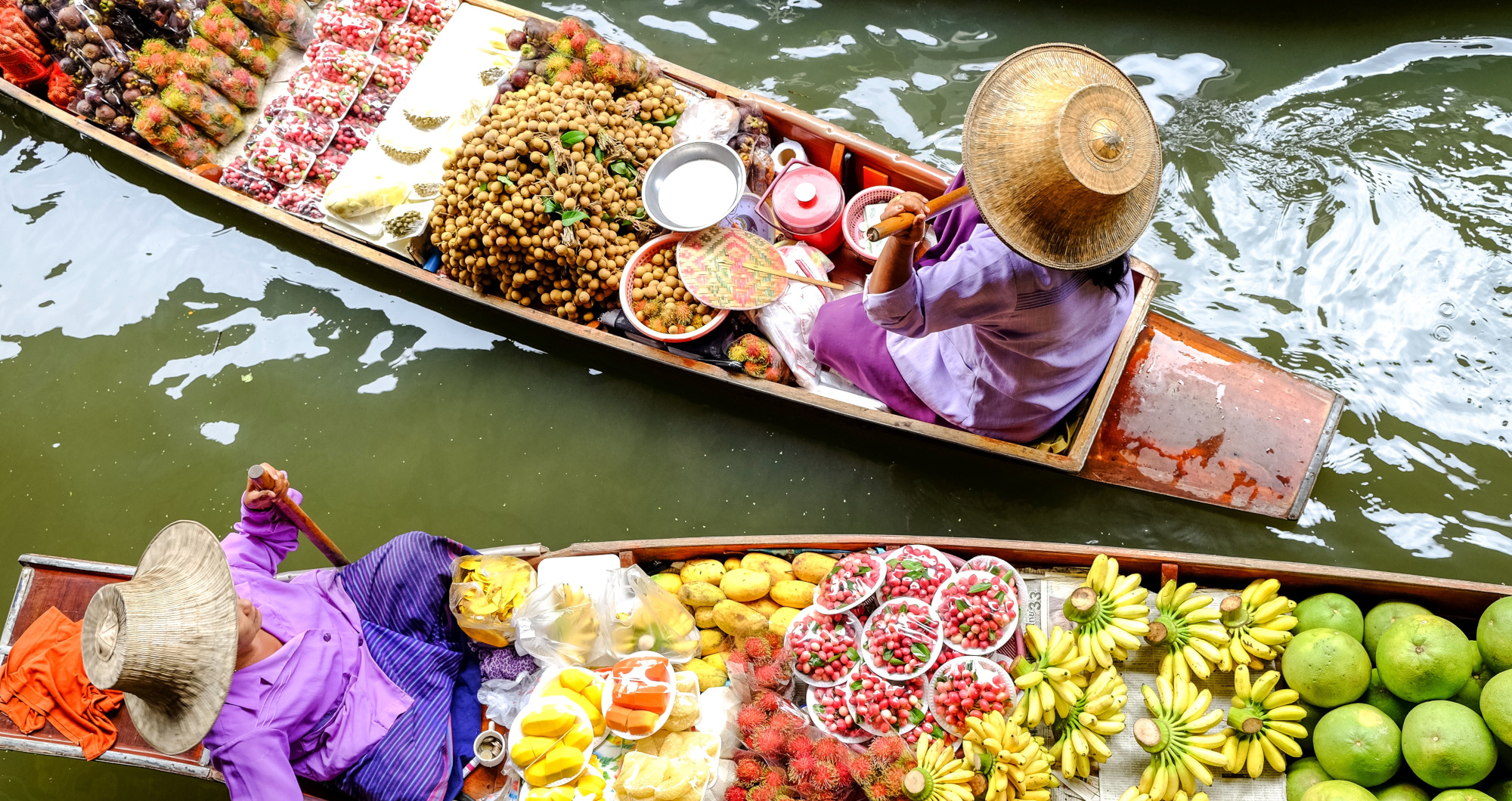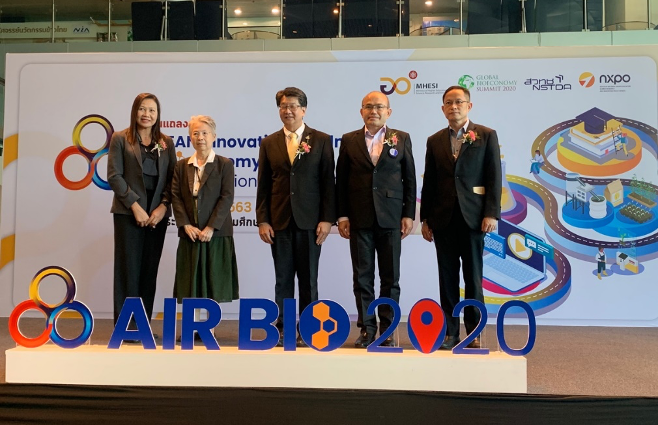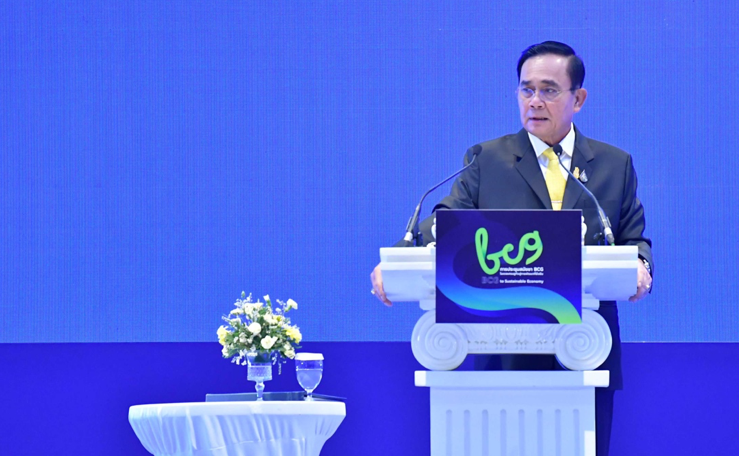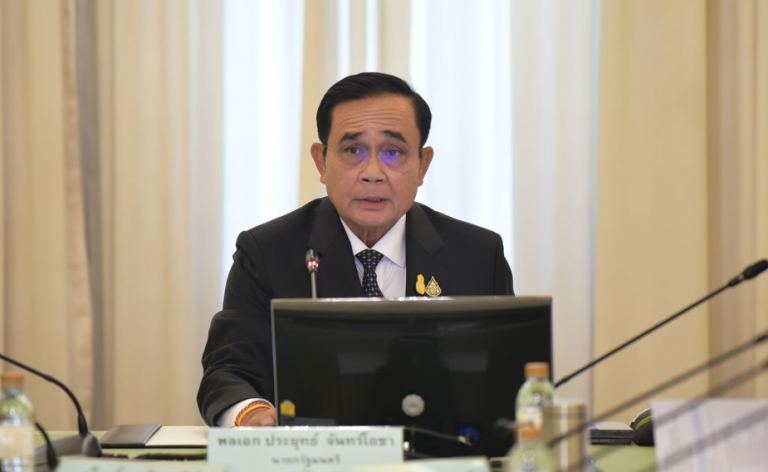National Science and Technology Development Agency (NSTDA)

Official Partner of the Global Bioeconomy Summit 2020
NSTDA is here representing the ASEAN region. The focus is on the bioeconomy activities of Thailand.
————————-
Fundamental concept of bioeconomy is the value creation of resources. As Thailand is blessed with robust agricultural activities, rich natural resources, and diversity in term of both biological resources and physical geography, the country is in an excellent position to take on bioeconomy.
Thailand is among top producers and exporters of several agricultural commodities and aquacultures such as rice, cassava, sugarcane, para rubber and shrimp. Some of these crops are of significant importance to both food and energy security.
In addition to strong biomass production sector, food industry and other related industry in the value chain also represent a large industrial sector in Thailand. The food industry contributed approximately 23% of the country’s GDP and the value of Thailand’s food industry, including local consumption and exports, is expected to reach USD102 billion in 2017.[1]
Thailand is situated in “Indo-Burma” – a biodiversity hotspot that is ranked as the eighth most bio-diverse region in the world. Hosting several forest types and aquatic habitats, Thailand is estimated to support about 10% of all species of living organisms in the world. Significant investment has been made to support biodiversity research and establish world-class infrastructure for preserving microorganisms with the purpose of utilization study, making the country No. 6 in the world in term of microbial collection.
[1] Thailand Food Industry (BOI brochure)
ASEAN Innovation Roadmap & Bioeconomy Forum
in Conjunction with GBS2020
Look forward to an interesting & varied program!
–> Impressions of Conference Day 1 – 16 November
The Association of Southeast Asian Nations (ASEAN) is an international body that promotes and facilitates cooperation among ten countries in Southeast Asia, namely Brunei, Cambodia, Indonesia, Laos, Malaysia, Myanmar, Philippines, Singapore, Thailand, and Vietnam. The region has a combined GDP of USD 3.0 trillion in 2018, with an average annual growth of 5.3% during 2000-2018. To maintain this growth rate, ASEAN member countries realized the need to capitalize on the opportunities presented by innovation and employ the concept of bioeconomy as a key to sustainability.
To present the latest development of innovation and bioeconomy initiatives in ASEAN, the Office of the Permanent Secretary, Ministry of Higher Education, Science, Research and Innovation (MHESI), in collaboration with the National Science and Technology Development Agency (NSTDA) and the Office of National Higher Education Science Research and Innovation Policy Council (NXPO), is hosting ASEAN Innovation Roadmap & Bioeconomy Forum on 16 – 20 November 2020 at Shangri-La Hotel, Bangkok.
The forum aims to showcase potential of ASEAN as a powerhouse of innovation and bio-based industry. This event will be held in conjunction with the Global Bioeconomy Summit 2020, which Thailand is co-hosting.
As a co-organizer of GBS2020, Thailand will be hosting an on-site event “ASEAN Innovation Roadmap & Bioeconomy Forum”, featuring discussions, talks, workshop and exhibition in a wide range of topics. Some activities in the on-site event in Thailand will be part of GBS2020 and webcasting to GBS audiences around the world.
The on-site event will also include the webcasting of speeches and policy addresses on bioeconomy from world leaders and representatives from many countries.
In addition, the on-site event will have exhibitions featuring projects and programs supporting bioeconomy such as bio-based products, community development and ecotourism, and investment incentives to promote new businesses in bioeconomy sector.
BCG in Action: The New Sustainable Growth Engine
In November 2019, Thailand’s Ministry of Higher Education, Science, Research and Innovation (MHESI) unveiled a proposal entitled “BCG in Action: The New Sustainable Growth Engine” mapping out strategies to drive BCG agenda forward.
Blessed with rich natural resources and strong agricultural activities, Thailand will apply the BCG model to focus on four s-curve industries – namely agriculture and food; bioenergy, biomaterial and biochemical; medical and wellness; and tourism and creative economy. Science, technology and innovation have enormous roles to play in this BCG movement. Innovations can be employed to enhance the capacity and competitiveness of players across the value chain, both upstream and downstream, in all four s-curve industries.
With proper agricultural innovations, farm productivity and efficiency can be raised, benefiting the whole bioeconomy as biomass is the foundation of all industries in the bioeconomy model. Farm production improvement also boosts income of farmers and communities, and thereby reducing social disparity.
Innovative technology can be applied to add value to resources and agricultural products, and thereby enhancing the competitiveness of downstream industries. High-value products for the agriculture and food industry could be, for examples, functional food ingredients; for health and medicine industry are biopharmaceuticals and precision medicine treatment; for energy and chemicals industry are valorized fuels and chemicals, and for tourism industry a medical or knowledge-based tourism.
The four target industries currently have a combined economic value of 3.4 trillion THB (21% of GDP). BCG model has a potential to increase the economic value to 4.4 trillion THB (24% of GDP) in the next five years.
BCG strategy consists of 4 drivers and 4 enablers, involving close collaborations among the government, industry, communities, academia and international organizations.
Four Drivers
BCG Sectoral Development.
BCG model will focus on four sectors.
- Food and Agriculture. The goal is to migrate from low-value commodities to value-added and premium products, as well as diversify products.
- Medical and Wellness. The goal is to build capacity on drug and biopharmaceutical production, medical devices and implants, precision medicine and become a hub of healthcare services and clinical research.
- Bioenergy, Biomaterial and Biochemical. The goal is to achieve energy security and convert biomass to high-value commodities.
- Tourism and Creative Economy. This sector aims to develop sustainable tourism, tourism destination management system, conserve the environment and link tourism with other service industry in order to advance to high-quality tourism such as wellness tourism, culinary tourism, eco tourism, cultural tourism and sports tourism.
BCG Talent & Entrepreneur Development.
BCG model will target the following groups:
- Startups
- Innovation-Driven Enterprises (IDEs)
- Smart Farmers
- High Value Service Providers
- Deep Technology Developers
- Creative Entrepreneurs
BCG Area-based Development.
Plans for area-based development are:
- Northern Economic Corridor (NEC). The focus of NEC will be on food safety and agricultural health standards, agro-industry and food processing, and the integration of “Lanna Culture” into the products and services.
- North-Eastern Economic Corridor (NEEC). The focus is on resolving major health issues inherent to this region such as liver fluke, promoting insect farming for an alternative protein source and developing cultural tourism along Mekong riverbank.
- Eastern Economic Corridor (EEC). The development in this region will focus on fruit production and the development of future industries.
- Southern Economic Corridor (NEC). This area will focus on precision aquaculture, innovative halal food products and development of new tourist destinations.
BCG Frontier Research/ Knowledge.
The following cutting-edge areas have been identified as important to the development of BCG:
- Complex Microbiota
- Omics Technologies
- Bioprocess Engineering
- Gene Editing and Synthetic Biology
- Terahertz Technology
- Decarbonization
- Artificial Intelligence and High-Performance Computing
- Advanced Digital Technology Platform integrating 5G connectivity and artificial intelligence system for applications in autonomous vehicle, neurocomputing and underwater surveyor
Four Enablers
1. BCG Regulatory Framework.
This enabler aims at reviewing and making amendments to laws and regulations in order to build an innovation ecosystem, support technology sandbox and enable product life cycle assessment.
2. BCG Infrastructure & Facility Development.
The following facilities will be developed and supported:
- Biobank
- National Quality Infrastructure (NQI)
- Pilot and Demonstration Plants
- High Performance Computing Facility
- Highspeed Internet
3. BCG Capacity Building.
This enabler aims at developing manpower in various fields and at all levels from students to current workforce. The fields that will be in demand in BCG models include taxonomy, system biology, bioinformatics, life sciences, computer engineering and data science.
4. BCG Global Network.
Collaboration with international partners will be developed in the forms of research collaboration, technology demonstration, technology localization, or joint investment.
News
Thailand to host ASEAN Innovation Roadmap & Bioeconomy Forum in Conjunction with GBS 2020 in November

9 November 2020.
At the press conference on 9 November 2020, Ministry of Higher Education, Science, Research and Innovation (MHESI) announced that Thailand will be organizing ASEAN Innovation Roadmap & Bioeconomy Forum in Conjunction with GBS 2020 on 16-20 November 2020 at Shangri-La Hotel Bangkok.
Joining the press conference were Asst. Prof. Dr. Pasit Lorterapong, MHESI S&T Counselor and Prof. Dr. Morakot Tanticharoen, Advisor to NSTDA President.
Read the full article here.
BCG assembly launches a 10 billion THB public-private partnership to drive BCG agenda

15 July 2020.
On 15 July 2020, Ministry of Higher Education, Science, Research and Innovation (MHESI) hosted a “BCG: An Economic Model for Sustainable Development” Assembly to demonstrate the potential of Bio-Circular-Green Economic Model (BCG) in leading Thailand towards the path of sustainable development and engage all stakeholders to set direction and requirements for the country to achieve BCG’s goal.
Such requirements include the revision of laws and regulations in order to foster innovation and application, infrastructure investment, market access expansion, financial tools, and mechanisms for knowledge and technology transfer to all sectors.
Read the full article here.
MHESI Minister and 8 leaders from all sectors propose BCG model for post-COVID economic recovery plan aiming to achieve 4.4 trillion THB GDP in 5 years

8 June 2020.
Dr. Suvit Maesincee, Minister of Higher Education, Science, Research and Innovation (MHESI) brought a team of eight top executives representing industries, entrepreneurs, academia, government agencies and people sector to meet Prime Minister General Prayut Chan-o-cha to discuss the use of Bio-Circular-Green Economic (BCG) Model to drive the national agendas which include food security, public health security, energy security, job security, environmental sustainability, as well as social inclusiveness.
Read the full article here.
Activities at the GBS2020
Thailand is leading the Spotlight Partner on Thursday 19th November from 11:30 to 12:00 (CET) and is participating the Partner Debate on Friday afternoon.


